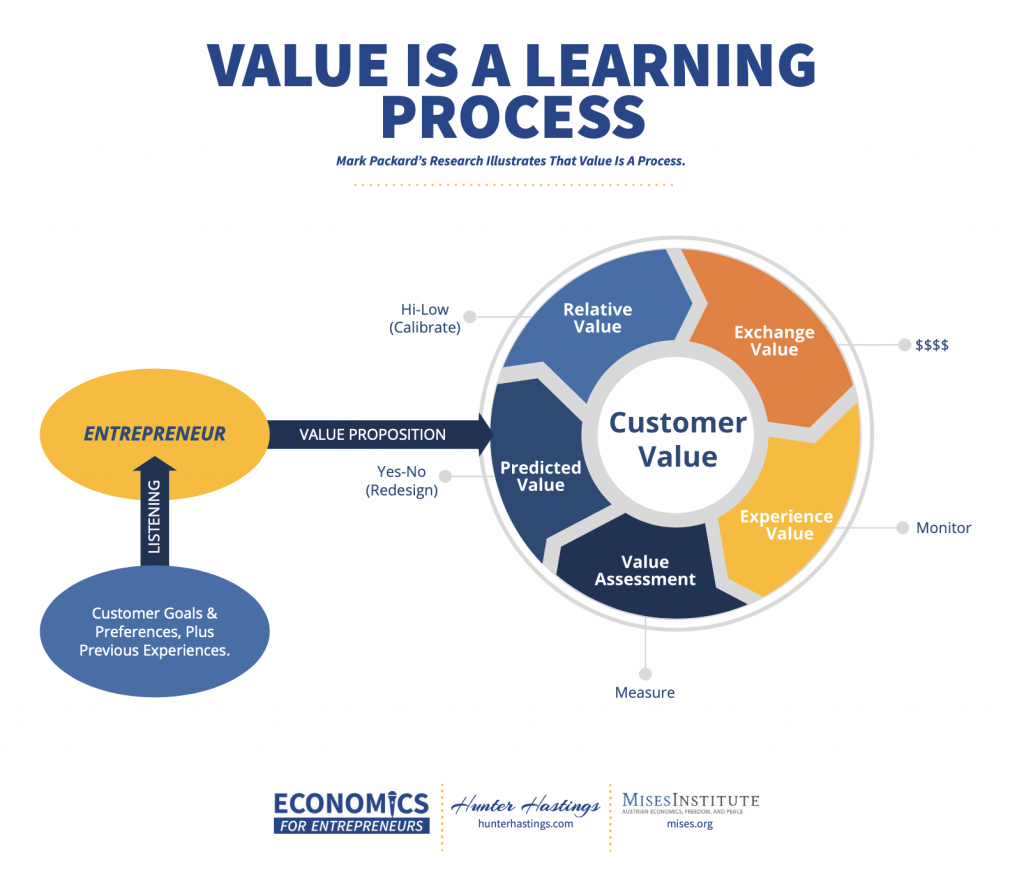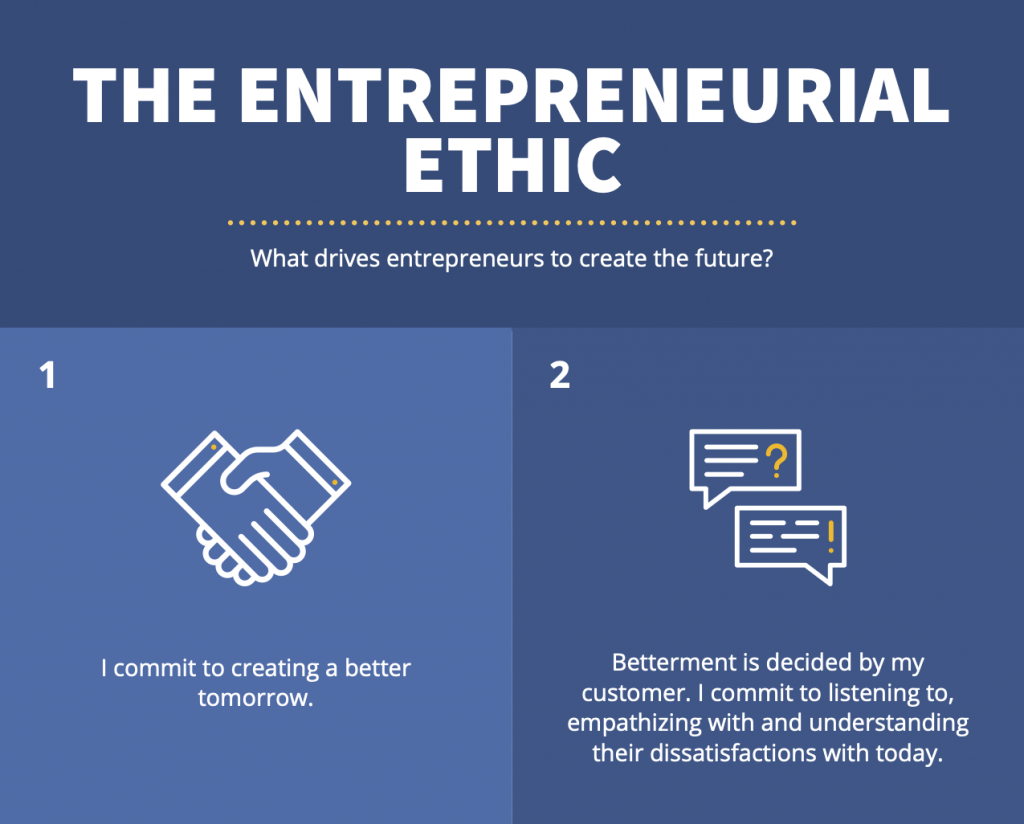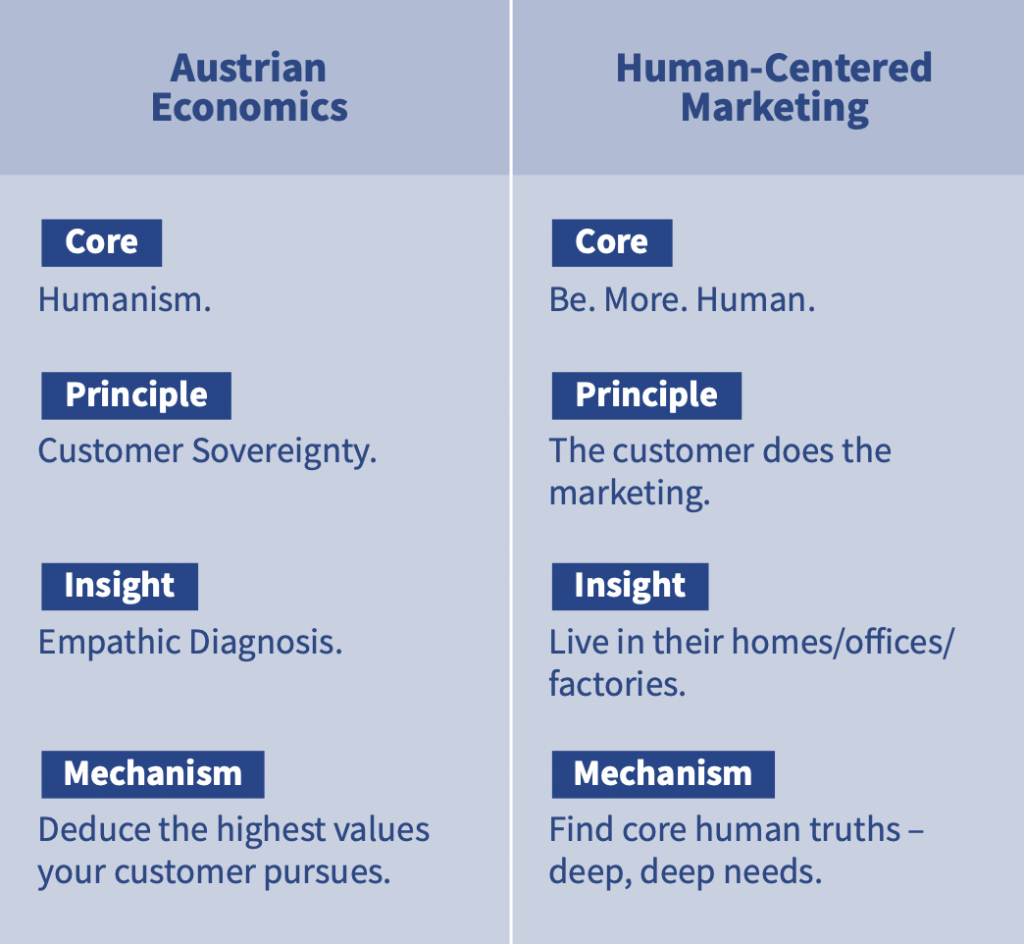55. Dr. Mark Packard On The Tools You Need To Make The Value Learning Process Work For Your Business
In this week’s Economics for Entrepreneurs podcast, Dr. Mark Packard tells us more about his research into the value learning process, and reveals two tools he has developed to help business teams to learn from customers and prospects.
Key Takeaways and Actionable Insights
The Austrian economic principle of subjective value – placing value entirely in the mind of the customer – helps Austrian entrepreneurs analyze value creation from a unique viewpoint. One of these is the value learning process, a new way of thinking about how to be a critical catalyst for a customer’s value experience.
Customers learn intentionally over time, endlessly looking for new and better ways to satisfy their various needs.
Mark’s research has identified 5 stages in this value learning process, depicted in the graphic below.
The 5 stages are: Predicted Value, Relative Value, Exchange Value, Experience Value and Value Assessment. Mark describes each stage at the beginning of the podcast.
Because the customer’s value learning process is intentional, it’s one the entrepreneur can monitor, measure and influence.
It’s an example of entrepreneurs learning from their customers, as those customers are conducting their valuation.
The customer is intentional, but not necessarily paying attention, when engaging in valuation.
Entrepreneurs have some work to do to track the customer’s learning process. They’re not taking note as they go. Mark talks about representationalism: how experience is a mental representation that our minds create from the stimuli that senses pick up. That could be going on while the brain’s attention is elsewhere. We’re not thinking consciously about wearing clothes or sitting on a chair, but we are experiencing those activities and we might defer our learning from them to the future, when thinking about buying new clothes or chairs.
For the entrepreneur to learn from the customer, it’s important to listen to the customers who are paying the most attention.
Don’t do your market research with customers from whom you can’t learn because they’re not paying enough attention to your value proposition or to the value experience you are interested in. Find the customers with the most highly developed need, and who are most dissatisfied with the status quo.
Dissatisfaction is a feeling that draws attention away from other distractions. It’s important to customers because it’s disconcerting, unwanted. It’s a high-learning event. In dissatisfaction, customers are finding something new about their need and how to (not) satisfy it. It’s a good time to ask them.
Dissatisfied customers are motivated to share their learning because they are searching for a better solution.
Customers are in the learning process and, if they experience dissatisfaction, they know they need to search for an alternative. Sharing dissatisfaction might result in some new learning for them. They’re willing to talk to you because you are trying to solve their problem.
Focus your research on the highest need, high dissatisfaction customer.
They’ll yield the richest research results, most likely to help you develop an effective value proposition.
When talking to these customers, it’s critical to utilize mindfulness: ensuring customers are in full experiential mode and ignoring all other distractions.
You might think of mindfulness techniques as helping with meditation. But we are able to adapt them for use in our processes of Austrian entrepreneurship. Mark uses step-by-step instructions to talk customers through a mindfulness technique to get the best information and understanding of their needs and satisfaction/dissatisfaction experiences. Entrepreneurs can use the tool at many stages of the value learning process, both at the early development stage for new concepts, and at the marketplace learning stage to tap into their experience of competitive products and services that are making them dissatisfied. We’ve created a new graphic indicating a couple of stages where they could be employed.
With the High Knowledge Customers Tool and the Mindfulness Tool, we’re providing business teams with important equipment to harness the value learning process and reap the developmental benefits of new customer knowledge.
Here is an illustration of where these two tools can be applied in the Value Learning Process. We’ll release Dr. Packard’s teaching course in the coming months, as part of our resources platform for entrepreneurs. These tools and several more will be featured in full in Dr. Packard’s new course. Give us your email address if you’d like to receive information about its release.
Items Mentioned In This Episode
Waiting List Signup for Dr. Packard’s Tools – Click Here
Austrian Entrepreneur’s Journey Course – Click Here
Free Downloads & Extras
Tools for the Value Learning Process: Our Free E4E Knowledge Graphic
Understanding The Mind of The Customer: Our Free E-Book
Start Your Own Entrepreneurial Journey
Ready to put Austrian Economics knowledge from the podcast to work for your business? Start your own entrepreneurial journey.


